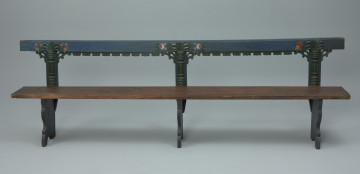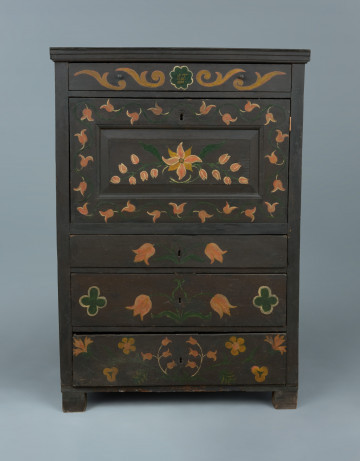
Bench
1. połowa XIX wieku
National Museum in Szczecin
Part of the collection: Pyrzycka folk culture
A chair with a characteristic form with a trapezoid seat and symmetrically profiled backrest in the central part of a handle, usually heart-shaped, is called zydel [folk stool]. Such chairs originate from Renaissance furniture-making when we see them in the chambers of lords and eminent citizens. In the 17th century, they were already used by the bourgeoisie, nobility and the wealthiest peasants. In the eighteenth century, they slowly made their way to the lowest strata, first in Silesia, West Pomerania, Warmia and Masuria, then as early as in the nineteenth century, in Kurpie and the mountains - Podhale and the Silesian and Żywiec Beskids. In the rest of Poland, they were little known or not used at all. Their regional varieties differed mainly in painting and cutting out of the backrest, the so-called 'zaplecka'. In West Pomerania, the backs of some zydels were cut in the shape of a one- or two-headed eagle. A chair of this type from the collection of the National Museum in Szczecin has a trapezoid seat with chamfered corners and a decoratively cut back. The cut-outs are symmetrical and 'openwork', i.e., they give a lot of free space in relation to typical Pomeranian stools. The cut-out depicts a two-headed eagle crowned with a crown. The centre of the backrest is cut out in the shape of a heart, while in the lower part, there are cut-outs like bird's legs and tail. The line of eagle wings defines the width of the backrest. Four widely-spaced legs support the almost equally wide seat. The seat and legs are uniformly painted dark navy-blue, the backrest is dark brown, while the royal colours red and gold mark the contours of the eagle and the crown.
Iwona Karwowska
Author / creator
Dimensions
cały obiekt: height: 96 cm, width: 47 cm
Creation time / dating
Creation / finding place
Identification number
Location / status

1. połowa XIX wieku
National Museum in Szczecin

1176 — 1225
National Museum in Szczecin

początek XX wieku
National Museum in Szczecin
DISCOVER this TOPIC
National Museum in Szczecin
DISCOVER this PATH
Educational path